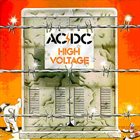

The electrified rhythm and blues that began to flow across the Atlantic to the British Isles in the late 1950s was pretty damn cool. It was "food" for many teenagers who, a few years later, would be at the birth of bands like the Beatles, the Rolling Stones and the Who, but it also had the potential to appeal to kids whose chins had barely stopped dripping milk - like the two youngest offspring of Scotland's large Young family. Malcolm and Angus took their love of guitar heroes Muddy Waters and Chuck Berry with them to far-off Australia on the eve of the outbreak of Beatlemania. For the next decade, news of the newborn rock, which was growing up like a sponge and soaking up all the influences it encountered came to them only in spurts. They completely missed the psychedelic delirium, the courtship with jazz and classical or the arching art-rock architecture. What remained in their hearts was the blues, which they did not hesitate to shave to the raw marrow, following the example of the black masters.
Such is the music on AC/DC's debut album High Voltage, on which the brothers (with another sibling, George, as producer) set out to pursue their own rock vision. At its core is the blues, but it's closer to the rhythm-and-blues incisiveness and plainspokenness of black Delta outcasts than to British guitar lyricism. From the hard rock inventory, this music then takes the help of catchy riffs, which add juice and drive to the whole bluesy can. Most of the time, these are not complicated or pieces - AC/DC have been unique in their ability to build novel figures and melodies on a minimum of notes since their beginnings.
The individual tracks on their debut album oscillate between riff-heavy hard rock that even the likes of Free would be ashamed of (Stick Around), loaded stompers (She's Got Balls) and free-flowing treats with a proper bottom-heavy bottom end (Little Lover). The songs don't lack in the slightest for room for instrumental savagery, exemplified by the six-and-a-half-minute long Soul Stripper, which features some blistering solos. Moreover, the two guitarists hadn't quite worked out their roles at that point, so for a good half of the songs, the later "grey eminence" and rhythm player Malcolm shows that he is comfortable with the higher positions of his fingerboard too. Seriously, the Youngs were keeping a close eye on the genre's development in their native Britain - that is evidenced by the fact that they based their arrangement of the Baby, Please Don't Go by "King of the Nine Strings" Big Joe Williams largely on the version released by Irish rhythm-and-bluesmen Them in 1964.
On their debut, the band's hands were clearly not tied in the slightest by the desire to generate a hit. Probably the closest they come to that category is a piece with the instructively titled Love Song, which after a hopefully loaded intro goes into a shallow goo. AC/DC probably faltered here - fortunately only for once - and with a song that didn't do much for the single, they spoiled the ending of an otherwise pretty solid record in my eyes.
Frontman Bon Scott, the author of the vast majority of the lyrics, handled the specific spirit of the album in his own way - following the tried-and-true blues manner, he went about describing women ranging from "vessels full of sin" to incompetent toys designed to satisfy male desires. In some places, with a balanced degree of obscene double entendres, he hit the bull's-eye (She's Got Balls), in others (Love Song) the pathos is rather overwhelming. On the other hand, I much really appreciated the lyrics of the closing track Show Business, which takes on the woes of a musician being ripped off by promoters instead of the weaker sex - a blues evergreen, too, in fact.
All round, High Voltage is a pretty decent debut for me. There's still more in the blues template than the band may have needed to achieve worldwide success, and tempting the audience with pop sweetness won't be necessary in the future either. But the tools that the band will use to inject fresh blood into the veins of exhausted British hard rock within a year and a day are already present in elementary form. Seventies AC/DC are a solid ride with no downright weak spot for me, but in a peer comparison none of the Bon Scott albums fall below the level of the debut.